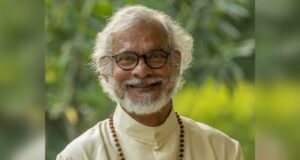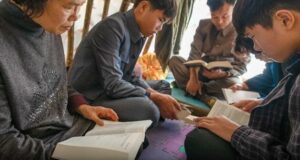Since Covid caused the closure of the border between South and North Korea, Christian groups are finding it impossible to smuggle bibles to the north. Now that difficulty may be enshrined in law.
One anonymous ministry leader told the watchdog group Daily NK, that “activities to send Bibles, religious books and rice to North Korea haven’t been going well since the border was closed because of COVID-19.”
The person, who spoke on condition of anonymity, added that smuggling religious materials and bibles with visitors “are now completely blocked.”
The Nehemiah Global Initiative (NGI), which has sent rice and Bibles to North Korea as part of its “Sea Route Project,” now works to help settle and support young North Korean defectors, including teaching English.
Now NGI is using phone calls and texting to share the Gospel as an alternative. “One-on-one missionary activity of preaching the Bible by telephone has increased since the COVID-19 pandemic began,” said the head of the missionary group.
But the pandemic has not dimmed North Koreans’ desire to seek information about Christ even as the country spirals even further into economic ruin. Mission groups say North Koreans are more receptive to the Gospel than before, and there are even recent cases of North Koreans asking for Bibles.
The group’s anonymous spokesperson added that as of late, North Koreans are grateful, while giving an insight into life there saying, “The situation is difficult, but thank you for not letting me starve” and “I’m grateful that I can pray.”
“For North Koreans, who don’t know about God or religion, to use words like ‘thank you’ and ‘pray’ is exceptional,” he noted.
Those who have accepted Christ are forming secret prayer groups with family members to whom they can confide. In a country where Christian faith can mean death, these new believers’ commitment to their faith is encouraging and inspiring.
Difficulty at getting Bibles into North Korea was made worse last week when South Korea’s legislature banned balloon launches meant to float messages into the north.
For more than a decade, the missions organization Voice of the Martyrs has been launching thousands of balloons filled with Korean language New Testament from the northern provinces of South Korea. The Bibles are set afloat in the dark of night, wrapped in plastic, riding wind currents across the Demilitarized Zone before descending across the rural countryside of North Korea.
In June of 2020, police forcibly stopped the balloon launches. Pastor Eric Foley of Voice of the Martyrs told Mission Network News that “What we’re facing now is a complete blockade for balloon launches, and the justification for it—that the South Korean government is giving to us—is that it ‘fouls the air for peace,’” Foley told
Now that temporary ban may be permanent.
The South Korean National Assembly last week approved legislation that imposes stiff fines and jail terms for sending balloons carrying USB sticks, Bibles and Bible verses, leaflets or money. Under the law, South Koreans and missionaries would be punished with fines of up to $27,000 and up to three years in prison.
The new law was passed by the National Assembly in a partisan vote, with the country’s Democratic Party. The vote was boycotted by the opposition.
Assemblyman Tae Yong-ho, who had been a North Korean diplomat and was deputy chief of mission at the North Korean embassy in London before he defected to the South, spoke for 10 hours during the debate. Tae passionately pleaded that the law was “aimed at joining hands with Kim Jong-un and leaving North Korean residents enslaved for good.”
The Democratic Party used its three-fifths parliamentary supermajority to stop the speeches and bring the issue to a final vote.
President Moon Jae-in now has the legislation on his desk and is expected to sign it
Foreign Minister Kang Kyung-wha raised eyebrows when she stated that that freedom of expression found the country’s constitution should be limited because balloon leaflets “endanger the safety of people living in border regions.” She said, “Freedom of expression, I think, is absolutely vital to human rights, but it’s not absolute. It can be limited.”
–Dwight Widaman | Metro Voice
 Metro Voice News Celebrating Faith, Family & Community
Metro Voice News Celebrating Faith, Family & Community 








